Unit 3 Topic 3 What were you doing at this time yesterday? Section D 课件(共30张PPT) 2024-2025学年英语仁爱版八年级
文档属性
| 名称 | Unit 3 Topic 3 What were you doing at this time yesterday? Section D 课件(共30张PPT) 2024-2025学年英语仁爱版八年级 |
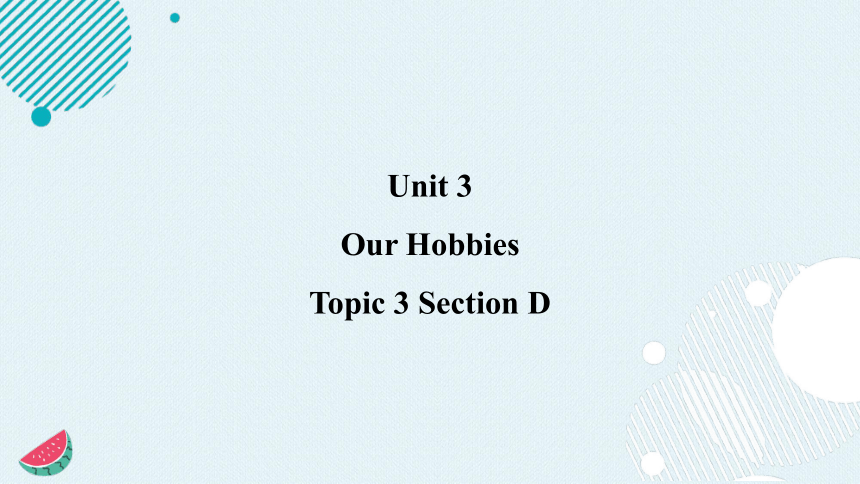
|
|
| 格式 | pptx | ||
| 文件大小 | 2.3MB | ||
| 资源类型 | 教案 | ||
| 版本资源 | 仁爱科普版 | ||
| 科目 | 英语 | ||
| 更新时间 | 2024-08-14 15:46:58 | ||
图片预览

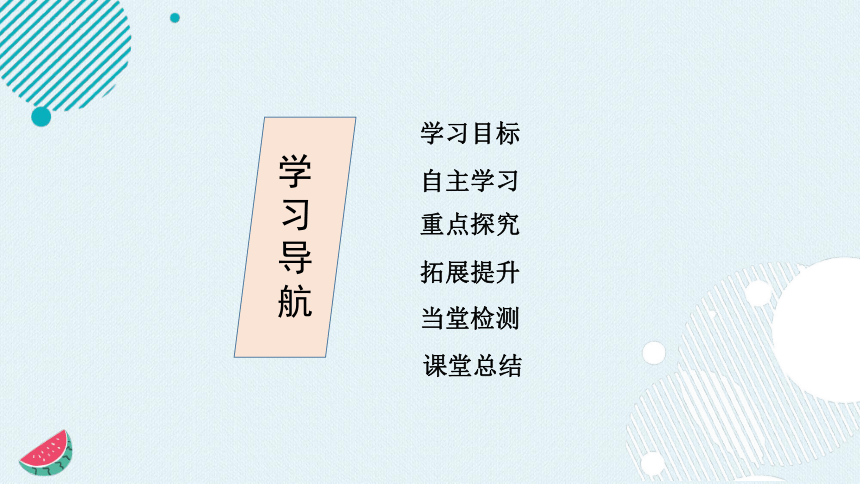
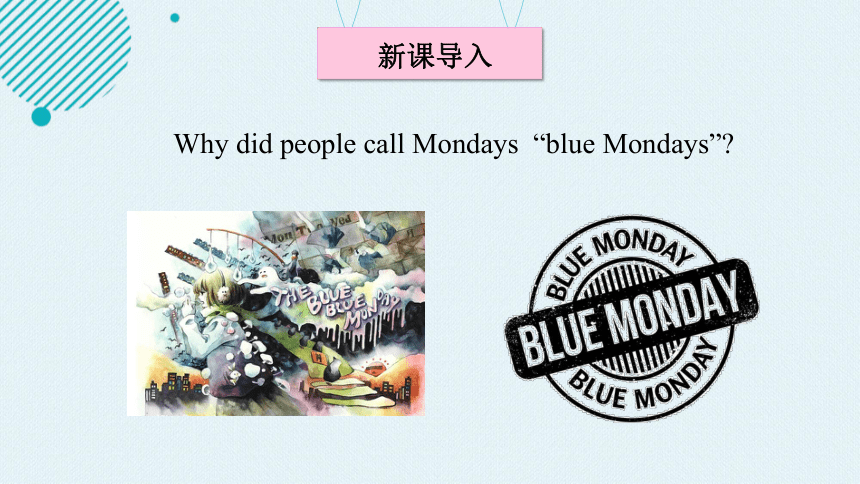
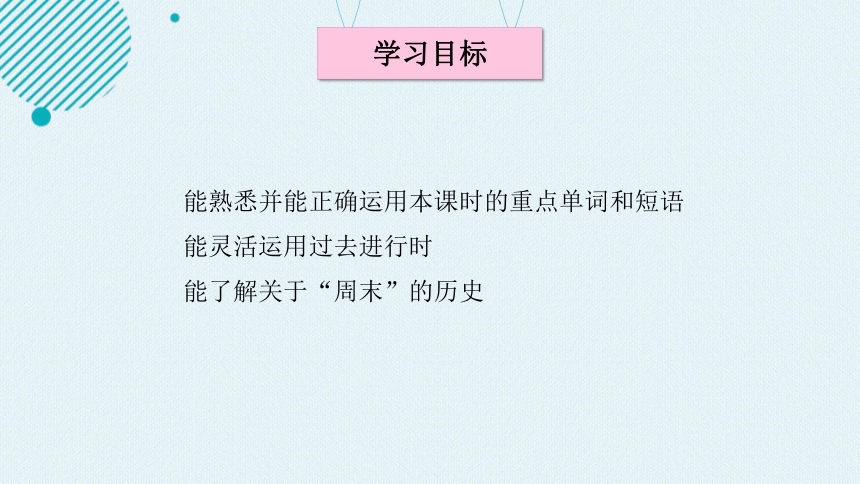
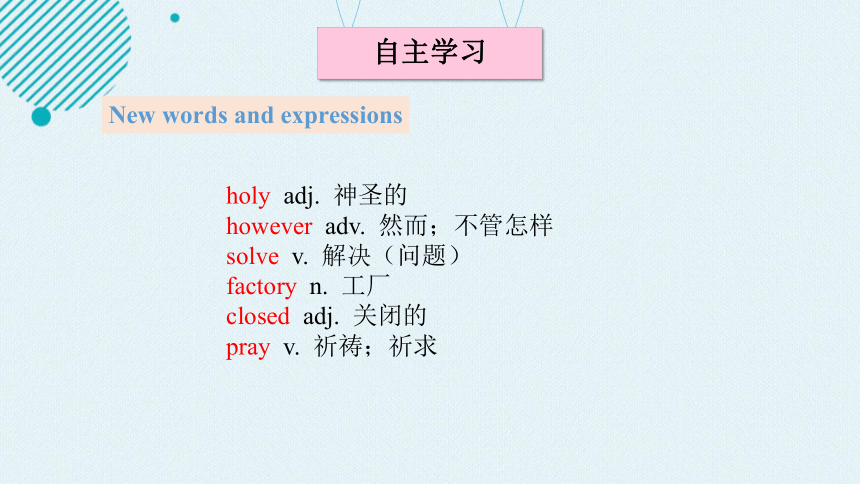
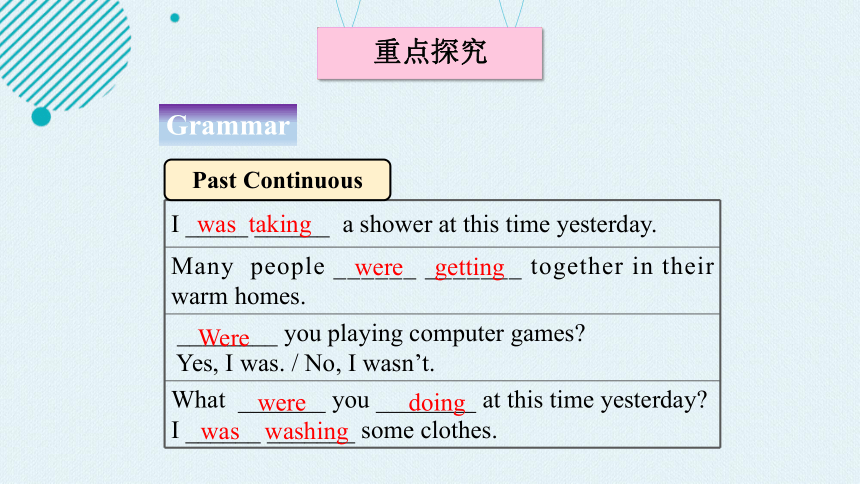
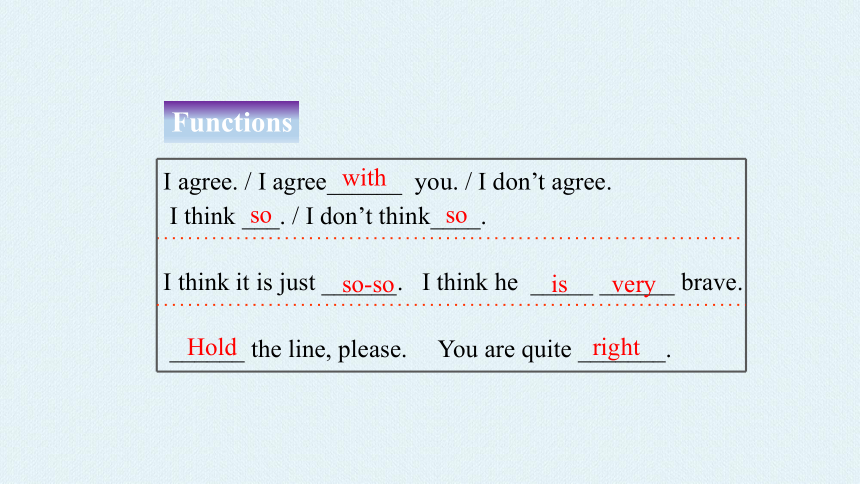
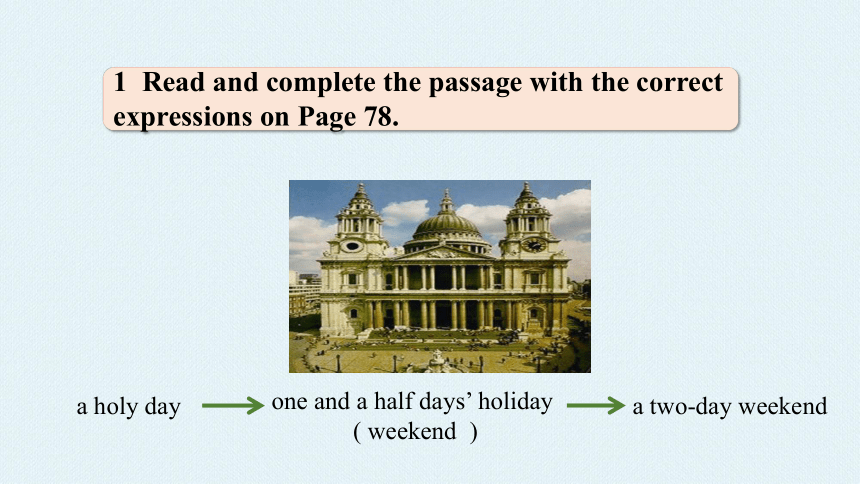
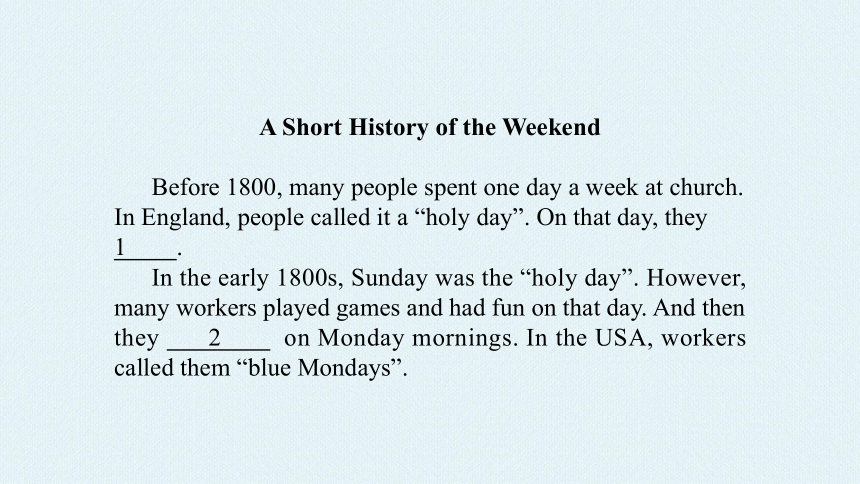
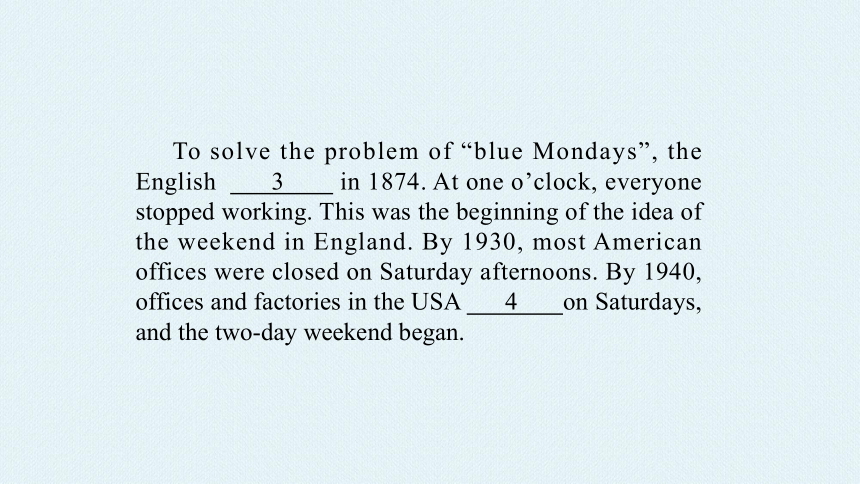
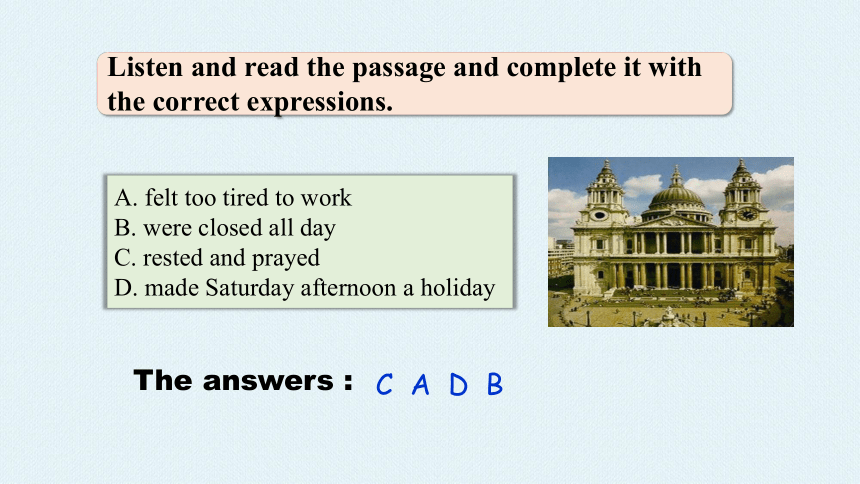
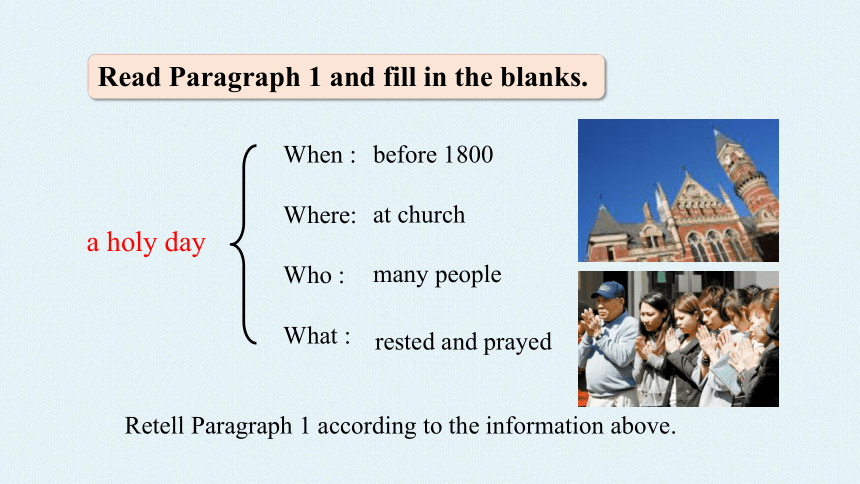
文档简介
(共30张PPT)
Unit 3
Our Hobbies
Topic 3 Section D
学习目标
重点探究
自主学习
学习导航
当堂检测
课堂总结
拓展提升
新课导入
Why did people call Mondays “blue Mondays”
学习目标
能熟悉并能正确运用本课时的重点单词和短语
能灵活运用过去进行时
能了解关于“周末”的历史
自主学习
New words and expressions
holy adj. 神圣的
however adv. 然而;不管怎样
solve v. 解决(问题)
factory n. 工厂
closed adj. 关闭的
pray v. 祈祷;祈求
重点探究
I _____ ______ a shower at this time yesterday.
Many people ______ _______ together in their warm homes.
________ you playing computer games
Yes, I was. / No, I wasn’t.
What _______ you ________ at this time yesterday
I ______ _______ some clothes.
was taking
were getting
Were
were
doing
was washing
Past Continuous
Grammar
Functions
I agree. / I agree______ you. / I don’t agree.
I think ___. / I don’t think____.
I think it is just ______. I think he _____ ______ brave.
______ the line, please. You are quite _______.
with
so
so
so-so
is very
Hold
right
1 Read and complete the passage with the correct
expressions on Page 78.
a holy day
one and a half days’ holiday
( weekend )
a two-day weekend
A Short History of the Weekend
Before 1800, many people spent one day a week at church. In England, people called it a “holy day”. On that day, they 1 .
In the early 1800s, Sunday was the “holy day”. However, many workers played games and had fun on that day. And then they 2 on Monday mornings. In the USA, workers called them “blue Mondays”.
To solve the problem of “blue Mondays”, the English 3 in 1874. At one o’clock, everyone stopped working. This was the beginning of the idea of the weekend in England. By 1930, most American offices were closed on Saturday afternoons. By 1940, offices and factories in the USA 4 on Saturdays, and the two-day weekend began.
A. felt too tired to work
B. were closed all day
C. rested and prayed
D. made Saturday afternoon a holiday
The answers :
Listen and read the passage and complete it with
the correct expressions.
C A D B
a holy day
When :
Where:
Who :
What :
Retell Paragraph 1 according to the information above.
Read Paragraph 1 and fill in the blanks.
before 1800
at church
many people
rested and prayed
one and a half day’s holiday
in the early 1800s the USA
in 1874 England
in 1930 America
blue Mondays
workers
Saturday afternoon holiday
the beginning of the weekend
offices were closed
on Saturday afternoons
Read the rest paragraphs and find out the
information about one and a half days’ holiday.
Look at the information about the two-day weekend
and try to retell it and then check.
the two-day weekend
by 1940
in the USA
Offices and factories were closed all day on Saturdays.
When :
Where:
What :
1. Before 1800, people
2. In the early 1800s, many workers
3. In 1874, English workers
4. By 1930, most American workers
5. After 1940, American workers
c
e
d
b
a
Read 1a again and match the following sentences.
a. had a two-day weekend.
b. didn’t work on Saturday afternoons.
c. rested and prayed on the “holy day”.
d. stopped working at one o’clock on Saturday afternoons.
e. played games and have fun on Sundays, and then they
felt too tired to work on Monday mornings.
Activity Feeling
watch a movie wash one’s clothes play basketball visit friends … happy
excited
tired …
2 Did you have a good time last Sunday What were
you doing at different times Write a passage about it.
The following words and phrases may help you.
You can write like this :
Last Sunday I was very busy. I got up at 7:00 a.m. When Jim called me after breakfast, I was doing my homework. He wanted me to play with him. We played basketball happily from 10:00 to 12:00.
In the afternoon, I was washing my clothes from 2:00 to 2:30. From 3:00 to 4:00 I was reading comics. At 4:30 I went with my parents to see my grandparents. After we got back home, I helped my mother do the cooking. After supper, we all went out for a walk, and then we were watching TV from 8:00 to 9:00.
When I went to bed, I felt very tired. But I was happy.
Surveying Sunday Activities
Project
1) What do you usually do on Sundays
2) What were you doing at 10:00 a.m. last Sunday
Survey your classmates about their activities on Sundays.
The following questions may help you.
A: What were you doing at that time last Sunday, B
B: I was watching TV. What were you doing, C
C: I was…
…
2. Work in groups and play a chain game.
You may begin like this:
I usually play soccer on Sundays. But last Sunday, I was listening to music at 10:00 a.m. at home. At that time, My friend, Qiqi,was watching TV...
3 Report your survey results to your class.
Language points
拓展提升
1. Many people spent one day a week at church.
很多人一周会花一天在教堂。
人+spend sth. (in) doing sth.
sth. on sth.
人+pay sth. for sth.
他花了十块钱买这本书。
He spent 10 yuan (in) buying the book.
=He spent 10 yuan on the book.
=He paid 10 yuan for the book.
{
2. In the early 1800s, Sunday was the “holy day”.
在19世纪早期,星期日的含义就是“神圣的一天”。1800s表示19世纪,同样的,1900s则表示20世纪。in the 1800s 在 19 世纪;
in the 1920s 在 20 世纪 20 年代;in the early 1800s 在 19 世纪早期;before 1800 在1800年以前;in 1800 在1800年; by1930 到1930年;表“世纪或年代”用“in + the +(年数s)”如:In the 1800s 在19世纪;(注意:要用 the, 年数后加s,而表示具体的某一年不用the, 也不加s, 如:in 2009 )
3. And then they felt too tired to work on Monday mornings.
到了星期一上午他们都太累了以致于不能工作。(1) a. too..... to..... 意为“太……而不能……”, too 前用否定词(never)时,表示肯定。It’s never too late to learn. 活到老,学到老。 b. too....to...意为“太……而不……”表示否定意义时,可用not.....enough 或so..... that 否定句来改写。 He is too young to go to school. = He isn’t old enough to go to school.= He is so young that he can’t go to school.
他太小了不能去上学。
(2) on 介词, 表示在具体的某一天或某一天的上、下午及晚上时,要用介词on。on Sunday morning 在星期天的早晨;
on a cold morning in July 七月一个寒冷的早上;
at 7:00 在七点;
at noon 在中午;
in the morning 在早上。
4. In the USA, workers called them“blue Mondays”.
在美国,工人们把它们叫做“蓝色星期一”。蓝色(blue)在汉语中的引申意义较少,而在英语中blue是一个含义十分丰富的颜色词。在翻译同这一颜色有关的表达时,我们应该注意其中的特别含义。
英语的blue常用来喻指人的“情绪低落”、“心情沮丧”、“忧愁若闷”,如:They felt rather blue after the failure in the football game.球赛踢输了,他们感到有些沮丧。
类似的表达: black tea 红茶; white elephant 笨蛋; a Red Man 印第安人; a grey day 阴天;知识拓展:blue moon 不可能或稀有的时期或事情;The story is just a blue moon.
这个故事根本就是件不可能的事。
5. At one o’clock,everyone stopped working.
在一点钟,所有的人停止工作。stop doing sth. 意为“停止做某事”,指停止做原来的事情 。stop to do sth. 指的是停下来(手头的事)去做另外一件事。Hearing the doorbell,she stopped washing the dishes.
听见门铃声,她停止洗碗了。类似的有:go on doing sth. 继续做某事(同件事);go on to do sth. 接着去做某事(另件事)。
6. This is the beginning of the idea of the weekend in England.
这就是周末这一想法在英国的雏形。
the beginning of 表“…的开始”;
at the beginning of 表“在…的开始”;如: at the beginning of the month 在月初。
当堂检测
一、请根据句意及括号内的提示完成下列句子。
1. It ___________(rain) hard when I left school last Saturday.
2. Peter__________(do) his homework now, but at this time
yesterday he ___________(watch) a TV play.
3. ____ you _______ (write) a letter when the telephone rang
4. A young man saw it happen while he ___________(walk)
along the road.
5. What _____they ______(do) at seven yesterday evening
was raining
is doing
was watching
Were watching
was walking
were doing
课堂总结
Unit 3 Topic 3
Section D
经常发生
过去某个时间点
黑色星期一
重点单词和短语:however, solve, factory, wash one’s clothes, on that day, play games, have fun, too...to, on Monday morning, stop doing sth., the beginning of
一般现在时与过去进行时的区别:
一般现在时描述的是
__________的动作、存在的状态或习惯性的动作。
2.过去进行时描述的是______________或某段时间内进行或发生的动作。
双休日的由来:
1.为了解决“黑色星期一”的问题,到1840年,美国的机关单位和工厂开始了两天的周末。
经常发生
过去某个时间点
Unit 3
Our Hobbies
Topic 3 Section D
学习目标
重点探究
自主学习
学习导航
当堂检测
课堂总结
拓展提升
新课导入
Why did people call Mondays “blue Mondays”
学习目标
能熟悉并能正确运用本课时的重点单词和短语
能灵活运用过去进行时
能了解关于“周末”的历史
自主学习
New words and expressions
holy adj. 神圣的
however adv. 然而;不管怎样
solve v. 解决(问题)
factory n. 工厂
closed adj. 关闭的
pray v. 祈祷;祈求
重点探究
I _____ ______ a shower at this time yesterday.
Many people ______ _______ together in their warm homes.
________ you playing computer games
Yes, I was. / No, I wasn’t.
What _______ you ________ at this time yesterday
I ______ _______ some clothes.
was taking
were getting
Were
were
doing
was washing
Past Continuous
Grammar
Functions
I agree. / I agree______ you. / I don’t agree.
I think ___. / I don’t think____.
I think it is just ______. I think he _____ ______ brave.
______ the line, please. You are quite _______.
with
so
so
so-so
is very
Hold
right
1 Read and complete the passage with the correct
expressions on Page 78.
a holy day
one and a half days’ holiday
( weekend )
a two-day weekend
A Short History of the Weekend
Before 1800, many people spent one day a week at church. In England, people called it a “holy day”. On that day, they 1 .
In the early 1800s, Sunday was the “holy day”. However, many workers played games and had fun on that day. And then they 2 on Monday mornings. In the USA, workers called them “blue Mondays”.
To solve the problem of “blue Mondays”, the English 3 in 1874. At one o’clock, everyone stopped working. This was the beginning of the idea of the weekend in England. By 1930, most American offices were closed on Saturday afternoons. By 1940, offices and factories in the USA 4 on Saturdays, and the two-day weekend began.
A. felt too tired to work
B. were closed all day
C. rested and prayed
D. made Saturday afternoon a holiday
The answers :
Listen and read the passage and complete it with
the correct expressions.
C A D B
a holy day
When :
Where:
Who :
What :
Retell Paragraph 1 according to the information above.
Read Paragraph 1 and fill in the blanks.
before 1800
at church
many people
rested and prayed
one and a half day’s holiday
in the early 1800s the USA
in 1874 England
in 1930 America
blue Mondays
workers
Saturday afternoon holiday
the beginning of the weekend
offices were closed
on Saturday afternoons
Read the rest paragraphs and find out the
information about one and a half days’ holiday.
Look at the information about the two-day weekend
and try to retell it and then check.
the two-day weekend
by 1940
in the USA
Offices and factories were closed all day on Saturdays.
When :
Where:
What :
1. Before 1800, people
2. In the early 1800s, many workers
3. In 1874, English workers
4. By 1930, most American workers
5. After 1940, American workers
c
e
d
b
a
Read 1a again and match the following sentences.
a. had a two-day weekend.
b. didn’t work on Saturday afternoons.
c. rested and prayed on the “holy day”.
d. stopped working at one o’clock on Saturday afternoons.
e. played games and have fun on Sundays, and then they
felt too tired to work on Monday mornings.
Activity Feeling
watch a movie wash one’s clothes play basketball visit friends … happy
excited
tired …
2 Did you have a good time last Sunday What were
you doing at different times Write a passage about it.
The following words and phrases may help you.
You can write like this :
Last Sunday I was very busy. I got up at 7:00 a.m. When Jim called me after breakfast, I was doing my homework. He wanted me to play with him. We played basketball happily from 10:00 to 12:00.
In the afternoon, I was washing my clothes from 2:00 to 2:30. From 3:00 to 4:00 I was reading comics. At 4:30 I went with my parents to see my grandparents. After we got back home, I helped my mother do the cooking. After supper, we all went out for a walk, and then we were watching TV from 8:00 to 9:00.
When I went to bed, I felt very tired. But I was happy.
Surveying Sunday Activities
Project
1) What do you usually do on Sundays
2) What were you doing at 10:00 a.m. last Sunday
Survey your classmates about their activities on Sundays.
The following questions may help you.
A: What were you doing at that time last Sunday, B
B: I was watching TV. What were you doing, C
C: I was…
…
2. Work in groups and play a chain game.
You may begin like this:
I usually play soccer on Sundays. But last Sunday, I was listening to music at 10:00 a.m. at home. At that time, My friend, Qiqi,was watching TV...
3 Report your survey results to your class.
Language points
拓展提升
1. Many people spent one day a week at church.
很多人一周会花一天在教堂。
人+spend sth. (in) doing sth.
sth. on sth.
人+pay sth. for sth.
他花了十块钱买这本书。
He spent 10 yuan (in) buying the book.
=He spent 10 yuan on the book.
=He paid 10 yuan for the book.
{
2. In the early 1800s, Sunday was the “holy day”.
在19世纪早期,星期日的含义就是“神圣的一天”。1800s表示19世纪,同样的,1900s则表示20世纪。in the 1800s 在 19 世纪;
in the 1920s 在 20 世纪 20 年代;in the early 1800s 在 19 世纪早期;before 1800 在1800年以前;in 1800 在1800年; by1930 到1930年;表“世纪或年代”用“in + the +(年数s)”如:In the 1800s 在19世纪;(注意:要用 the, 年数后加s,而表示具体的某一年不用the, 也不加s, 如:in 2009 )
3. And then they felt too tired to work on Monday mornings.
到了星期一上午他们都太累了以致于不能工作。(1) a. too..... to..... 意为“太……而不能……”, too 前用否定词(never)时,表示肯定。It’s never too late to learn. 活到老,学到老。 b. too....to...意为“太……而不……”表示否定意义时,可用not.....enough 或so..... that 否定句来改写。 He is too young to go to school. = He isn’t old enough to go to school.= He is so young that he can’t go to school.
他太小了不能去上学。
(2) on 介词, 表示在具体的某一天或某一天的上、下午及晚上时,要用介词on。on Sunday morning 在星期天的早晨;
on a cold morning in July 七月一个寒冷的早上;
at 7:00 在七点;
at noon 在中午;
in the morning 在早上。
4. In the USA, workers called them“blue Mondays”.
在美国,工人们把它们叫做“蓝色星期一”。蓝色(blue)在汉语中的引申意义较少,而在英语中blue是一个含义十分丰富的颜色词。在翻译同这一颜色有关的表达时,我们应该注意其中的特别含义。
英语的blue常用来喻指人的“情绪低落”、“心情沮丧”、“忧愁若闷”,如:They felt rather blue after the failure in the football game.球赛踢输了,他们感到有些沮丧。
类似的表达: black tea 红茶; white elephant 笨蛋; a Red Man 印第安人; a grey day 阴天;知识拓展:blue moon 不可能或稀有的时期或事情;The story is just a blue moon.
这个故事根本就是件不可能的事。
5. At one o’clock,everyone stopped working.
在一点钟,所有的人停止工作。stop doing sth. 意为“停止做某事”,指停止做原来的事情 。stop to do sth. 指的是停下来(手头的事)去做另外一件事。Hearing the doorbell,she stopped washing the dishes.
听见门铃声,她停止洗碗了。类似的有:go on doing sth. 继续做某事(同件事);go on to do sth. 接着去做某事(另件事)。
6. This is the beginning of the idea of the weekend in England.
这就是周末这一想法在英国的雏形。
the beginning of 表“…的开始”;
at the beginning of 表“在…的开始”;如: at the beginning of the month 在月初。
当堂检测
一、请根据句意及括号内的提示完成下列句子。
1. It ___________(rain) hard when I left school last Saturday.
2. Peter__________(do) his homework now, but at this time
yesterday he ___________(watch) a TV play.
3. ____ you _______ (write) a letter when the telephone rang
4. A young man saw it happen while he ___________(walk)
along the road.
5. What _____they ______(do) at seven yesterday evening
was raining
is doing
was watching
Were watching
was walking
were doing
课堂总结
Unit 3 Topic 3
Section D
经常发生
过去某个时间点
黑色星期一
重点单词和短语:however, solve, factory, wash one’s clothes, on that day, play games, have fun, too...to, on Monday morning, stop doing sth., the beginning of
一般现在时与过去进行时的区别:
一般现在时描述的是
__________的动作、存在的状态或习惯性的动作。
2.过去进行时描述的是______________或某段时间内进行或发生的动作。
双休日的由来:
1.为了解决“黑色星期一”的问题,到1840年,美国的机关单位和工厂开始了两天的周末。
经常发生
过去某个时间点
同课章节目录
- Unit 1 Playing Sports
- Topic 1 I'm going to play basketball.
- Topic 2 I'll kick you the ball again.
- Topic 3 The school sports meet is coming.
- Unit 2 Keeping Healthy
- Topic 1 You should brush your teeth twice a day.
- Topic 2 I must ask him to give up smoking.
- Topic 3 Must we exercise to prevent the flu?
- Unit 3 Our Hobbies
- Topic 1 What's your hobby?
- Topic 2 What sweet music!
- Topic 3 What were you doing at this time yesterday
- Unit 4 Our World
- Topic 1 What's the strongest animal on the farm?
- Topic 2 How can we protect ourselves from the eart
- Topic 3 The Internet makes the world smaller.
